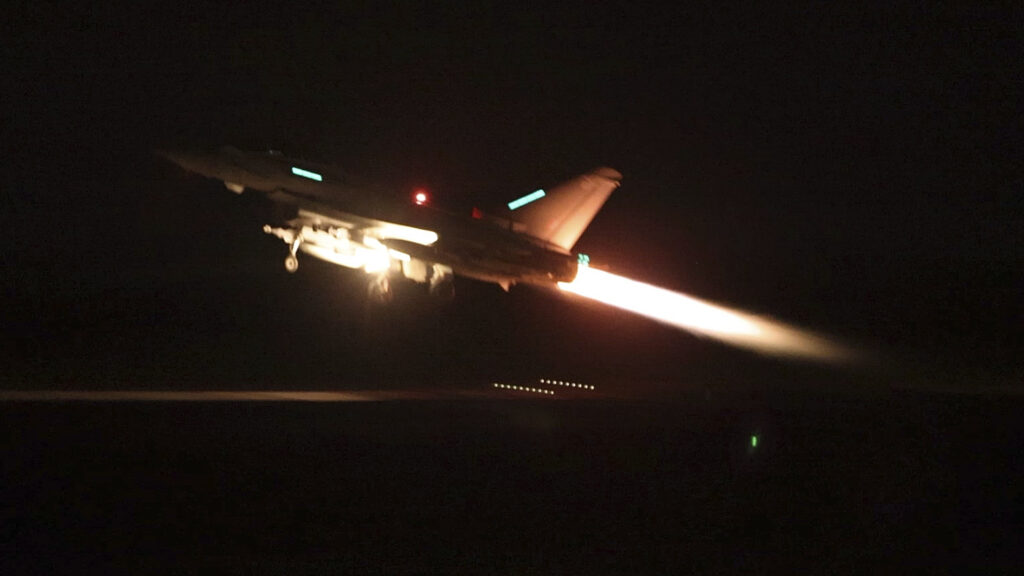U.S. push and shove with Yemen is not slowing down
- January 23, 2024
Photo: U.S. Navy photo
Antiwar protesters rallying against the devastation and bloodshed in the Gaza Strip from over 100 days of war by the Zionist State of Israel are also mobilizing to condemn the United States’ bombing of Yemen and to demand the “U.S. get out of the Middle East.” The military forces of America and the United Kingdom, along with Canada, Australia, Bahrain and the Netherlands, began striking cities in the small country of Yemen on Jan.12. Observers and analysts say it is a major rise of hostilities that can spiral to regional fighting.
“It’s clearly a major escalation on the part of the U.S. as part of this war … genocidal campaign waged by Israel against the people of Gaza,” said Brian Becker, executive director of the Act Now to End Racism (A.N.S.W.E.R.) Coalition.
“Because the people in Yemen are standing up and saying no to genocide … the U.S. is now bombing them. So, it marks a major escalation, even if the airstrikes turn out to be limited,” he told The Final Call.
The ANSWER Coalition mobilized a large gathering of anti-war advocates at the gates of the White House within hours after the initial strikes hit the cities of Sana’a, Hudaydah, Sa’ada and Dhamaremen. “We should acknowledge that this is a major escalation on the part of the U.S.,” he reiterated.
As the conflict heated up, more than 400,000 people embarked on the streets of Washington, D.C., on Jan. 13 in a Global Day of Action calling for ceasefire in Gaza that also included messages denouncing U.S. war in Yemen. On Jan 15, the Yemen based Ansar-Allah (Houthi) movement waged counter-attacks striking a U.S.-owned commercial ship off the coast of Yemen.
The strike on the Gibraltar Eagle owned by Connecticut based Eagle Bulk Shipping was one day after the Houthis fired an anti-ship cruise missile toward an American destroyer in the Red Sea. In a televised address the same night, Houthi military spokesman Brigadier General Yahya Saree claimed the attack.
“The Yemeni armed forces consider all American and British ships and warships participating in the aggression against our country as hostile targets,” he said.
Paired with Gen. Saree’s shoving back against what he calls “American” and “British” aggression on Yemen, are earlier words by Houthi leaders saying the targeting of commercial ships won’t cease until the Israeli aggression in Palestine ceases. Regional tension heightened since the October 2023 bombardment of Gaza began, that has by presstime killed nearly 25,000 mostly women and children. Growing numbers of critics deem the carnage as genocide perpetrated by the occupying power of Israel, backed by America and Western collaborators.
Joining what some call an “axis of resistance,” the Houthis entered the mix by attacking global merchant ships in the Red Sea, the Bab-el-Mandeb Strait, and the Gulf of Aden.
The U.S. contends that bombing the turmoil tattered Yemen is about the money and defending global trade lines. However, the Houthis say targeting shipping lines is about resistance, and placing pressure on America’s and Israel’s blocking global ceasefire demands.
The Yemeni Armed Forces declared in a Jan. 17 statement posted on X, a response to the U.S./British attacks on Yemeni soil is inevitably forthcoming. The statement said shipping traffic will continue undeterred to all destinations except the ports of occupied Palestine.
“Operations against Israeli ships or those heading to the ports of occupied Palestine will not stop until the aggression stops and the siege imposed on the steadfast Palestinian people in the Gaza Strip is lifted,” said the statement.
The strategy ties up a crucial corridor linking Asian and Mideast energy and cargo shipments to the Suez Canal, destined for Europe. Egypt’s Suez Canal connects the Red Sea to the Mediterranean Sea and is the fastest way to ship fuel, food and consumer goods from Asia and the Middle East to Europe, said Reuters. Up to 30 percent of cargo that arrives at the U.S. East Coast travels through the Suez Canal.

The U.S. and British militaries bombed more than a dozen sites used by the Iranian-backed Houthis in Yemen on Jan. 11, in a massive retaliatory strike using war-ship- and submarine-launched Tomahawk missiles and fighter jets, U.S. officials said. Photo: Sgt Lee Goddard, UK Ministry of Defence via AP
Since the American and British bombing of Yemen, multiple attacks on shipping vessels were reported to the United Kingdom Maritime Trade Operations (UKMTO), a British Naval security agency that receives reports of specific attacks and threats on ships in the region. It announced on Jan. 17 that, “Naval ships will conduct depth charge firing with live ammunition” in the waters. A depth charge is a type of anti-submarine weapon that explodes at a chosen depth.
Meanwhile, America continued bombing Yemeni sites as well as redesignated the Houthis a “Specially Designated Global Terrorist” group, effective Feb.17, 2024. The Biden administration previously removed the designation to help access to humanitarian aid into Yemen, during the U.S. backed Saudi Arabian-led coalition war against the Houthis.
The impact of the war which largely subsided in 2023, left Yemen in a dire humanitarian crisis. In a December 2023 country update, UNICEF noted after eight years of conflict, the national socio-economic systems of Yemen remain on the edge of total collapse, while conflict, large-scale displacement and recurring climate shocks.
“We demand an immediate end to this bombing campaign and all U.S. war threats,” said Mr. Becker. “We need a ceasefire now to end the genocide in Gaza, not an escalation to a regional war,” he said.
The firefights are happening amid amplified fear of a broader war in the explosive region involving America as a declining power but with formidable fire power. For the Houthis to chest bump with Washington, say observers, indicates the weakening teeth of America and its losing hand in the Middle East.
Months of war in Gaza, U.S.-driven conflicts around the region, and calls for America to leave—as requested by Iraq’s Prime Minister Mohammed al-Sudani in an interview on Jan.17 at the World Economic Forum (WEF) in Devos, Switzerland, where he said the U.S.-led Military Coalition in Iraq should leave—shows weakness in U.S. influence. The request is an ongoing demand that accelerated in the recent attacks on American military personnel and coalition soldiers and American counterattacks into Iraq and Syria.
According to the Pentagon, between Oct. 17, 2023, and Jan. 11, 2024, there were 130 attacks, including 53 in Iraq and 77 in Syria. Mr. al-Sudani condemned the attacks and U.S. counterattacks.
“The sooner we withdraw the coalition, it is a necessity for the security and stability of Iraq,” Mr. al-Sudani said at the televised WEF event. He told the interviewer it is the desire of the Iraqi people that the foreign forces leave. “It is also a necessity for preserving constructive bilateral relations between Iraq and the coalition countries.”
The pushback on America from Iraq as well as the Islamic Republic of Iran, heightened rhetoric, and threats by resistance groups throughout the region, and bold antiwar resistance on her own streets can be seen as America reaping what it has sown.
Such sentiment has been long warned of by the Honorable Minister Louis Farrakhan and his teacher, the Most Honorable Elijah Muhammad of the Nation of Islam. They cautioned America would lose in the Middle East.
The warnings of Messenger Muhammad and Minister Farrakhan are proving true. In His illuminating book, “The Fall of America,” Messenger Muhammad warned of terrible consequences of imposing Israel on Palestine. “America and England deposited their little brother, Israel, on foreign soil, Palestine, which is Arab land. They deprived the Arabs of their own land and sent them into exile,” wrote Messenger Muhammad.
“This injustice against the Arabs is now costing America the power and authority that she once exercised in the East. She is on her way out of the Near East,” He added. “This means bloodshed and plenty of it,” Messenger Muhammad warned.
